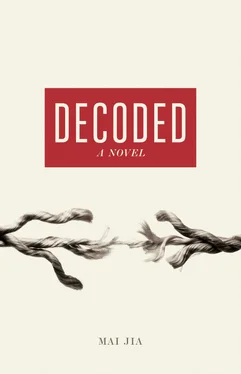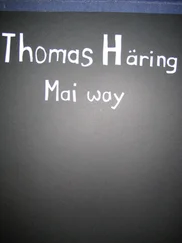Mai Jia - Decoded
Здесь есть возможность читать онлайн «Mai Jia - Decoded» весь текст электронной книги совершенно бесплатно (целиком полную версию без сокращений). В некоторых случаях можно слушать аудио, скачать через торрент в формате fb2 и присутствует краткое содержание. Год выпуска: 2014, Издательство: Allen Lane, Жанр: Современная проза, на английском языке. Описание произведения, (предисловие) а так же отзывы посетителей доступны на портале библиотеки ЛибКат.
- Название:Decoded
- Автор:
- Издательство:Allen Lane
- Жанр:
- Год:2014
- ISBN:нет данных
- Рейтинг книги:3 / 5. Голосов: 1
-
Избранное:Добавить в избранное
- Отзывы:
-
Ваша оценка:
- 60
- 1
- 2
- 3
- 4
- 5
Decoded: краткое содержание, описание и аннотация
Предлагаем к чтению аннотацию, описание, краткое содержание или предисловие (зависит от того, что написал сам автор книги «Decoded»). Если вы не нашли необходимую информацию о книге — напишите в комментариях, мы постараемся отыскать её.
Decoded — читать онлайн бесплатно полную книгу (весь текст) целиком
Ниже представлен текст книги, разбитый по страницам. Система сохранения места последней прочитанной страницы, позволяет с удобством читать онлайн бесплатно книгу «Decoded», без необходимости каждый раз заново искать на чём Вы остановились. Поставьте закладку, и сможете в любой момент перейти на страницу, на которой закончили чтение.
Интервал:
Закладка:
‘According to my knowledge, the time it takes the earth to complete one orbit of the sun is three hundred and sixty-five days, five hours, forty-eight minutes and forty-six seconds. So why do we need leap years? There is a simple reason: according to the solar calendar, every year there are five extra hours, whereby every four years you need a leap year which consists of three hundred and sixty-six days. However, as I am sure you will realize if you think about it, if you calculate that ordinary years consist of three hundred and sixty-five days and that each leap year contains three hundred and sixty-six days, you are still not going to obtain a completely accurate calculation. It is convenient for most ordinary purposes to let the mistake go by; in fact, it would be impossible to work the solar calendar without this acceptable error. What I am trying to tell you is that even if you had allowed for leap years, your calculation would still be wrong.
‘Now you can go away and work out how many leap years Mr Auslander lived through during his eighty-nine years and then add that number of days to your original calculation. Then you can work out how big the difference is between your original calculation and the new one. In a calculation involving figures of more than four places of decimals, the acceptable margin for error is normally set at 0.01 per cent; any more than that and you have made a mistake in your calculations. Right: now you tell me, is your mistake within the acceptable margin for error?’
Mr Auslander died in a leap year at the age of eighty-nine, thus he had lived through twenty-two leap years: that does not sound many, but it is also not a few. Adding one day for every leap year means that twenty-two leap years is equivalent to twenty-two days. Adding that to the more than 30,000 days that Mr Auslander had spent on this earth meant that it was a mistake well within the acceptable margin of error. The reason why Young Lillie made such a point of this is that he wanted Jinzhen to find a way to forgive himself for the mistake that he had made. Thanks to the way that Young Lillie first shouted at him and then cajoled him, Jinzhen finally calmed down.
[Transcript of the interview with Master Rong]
Later on, Daddy explained to us how Mr Auslander had asked Zhendi to work out his age. Thinking of how upset he had been, I suddenly found myself feeling moved by his obvious affection for the old foreign gentleman. On the other hand I also realized that he had an obsessive streak in his character — not to mention an inability to cope with his own mistakes. Later on we realized more and more clearly that Zhendi could on occasion be really stubborn and fierytempered; most of the time he was so quiet and kept himself to himself. He could put up with all sorts of things and simply carry on as if nothing had happened — in fact he could tolerate things that most people would find absolutely unendurable. But once an invisible line was crossed, once something had touched the most delicate part of his psyche, he would lose control very easily. This loss of control was always expressed by some extreme act. I could give you lots of examples of this kind of thing. For example, he really loved my mother and so one day he wrote a message in his own blood, completely in secret. What he said was: ‘Daddy is dead. The rest of my life is going to be devoted to looking after Mummy.’
When he was seventeen, he got terribly sick and spent a long time in hospital. Mummy discovered this note then, because she was forever popping into his room to look for something or other that he wanted. It was slipped inside the binding of his diary and written in large characters. It looked as though he had used the tip of a finger to write it, but there was no date on it, so we didn’t know when it had been written. It was clear that it was not recent, so I reckon that he probably wrote it during the first year or two that he was living with us. The foxing on the paper and the fading of the characters certainly suggested that it had been there for some time.
My mother was a very kind and gentle woman, friendly with everyone. She remained the same throughout her long life. When you think about her relationship with Zhendi, it really seemed as though they were destined to be friends, because the two of them got along amazingly well right from the very beginning. They had the kind of silent rapport that you normally only see among close family members. From the very first day that he came to live with us, Mummy called him Zhendi. I don’t know why she called him that; maybe it was because my little sister had only just passed away and she was transferring all her affection to him. After my sister died, Mummy didn’t set foot outside the house for the longest time; she just sat at home and mourned. Many nights she had nightmares, and during the day she often imagined that she saw my dead sister. Once Zhendi arrived, Mummy gradually recovered. Maybe you don’t know this, but Zhendi knew how to interpret people’s dreams. He was wonderfully good at it, just like visiting a professional shaman. He was a Christian though and read a little English-language Bible every day, even though he knew lots of passages completely off by heart. I think that the reason Mummy recovered so quickly and with so few setbacks along the way was entirely thanks to the fact that Zhendi was there interpreting her dreams for her and telling her stories out of the Bible. It is hard to explain exactly why they got on so well together. Of course, Mummy loved Zhendi; she always thought of him as one of the family and respected and cared about him. What nobody knew at the time was how deeply Zhendi was affected by this and how he became determined to repay her for everything that she did for him. That is why he secretly wrote that message in his own blood. In my opinion, Zhendi had lacked affection in his earlier life; in particular he had never experienced mother-love. Everything that Mummy did for him — cooking him three meals a day, making his clothes, asking him if he was too hot or too cold — this was all new to him and he felt it deeply. As time went on and more and more things were done for him, he wasn’t able to deal with his emotions any more and found this way of expressing his gratitude. Of course, the way that he chose was more than a little melodramatic, but that is the kind of boy he was. If I may be allowed the benefit of hindsight, I think that nowadays we would say that Zhendi was autistic.
I could cite lots of other examples of similar kinds of behaviour, and perhaps I will tell you about them later on. However right now we need to go back to the evening when he had hysterics, because the matter is not yet over. .
[To be continued]
The following evening, again at suppertime, Jinzhen returned to the matter that had been under discussion the previous day. He said that Mr Auslander had lived through twenty-two leap years and hence it might appear that he had got his figures out by twenty-two days, but that in fact he was only wrong by twenty-one days. That seemed completely stupid! If you have lived through twenty-two leap years then that adds one day for every year — it should be twenty-two days. Why did he say that it was twenty-one? Everyone, including Mrs Lillie, thought that he must have gone off his head. But when Jinzhen explained what he meant, those present realized that he had a point.
You see, Young Lillie had explained that leap years were introduced because in fact each year is 365 days, 5 hours, 48 minutes and 46 seconds long, and thus every four years they add another 24 hours. But obviously it is not precisely 24 hours that needs making up, because that would require the earth to take 365 days and 6 hours to travel once around the sun. How much is the error introduced? Every year it is 11 minutes and 14 seconds, so in other words over the course of four years, an error of 44 minutes and 56 seconds is introduced. This means that in every leap year cycle, a certain amount of time is added: 44 minutes and 56 seconds. Mankind steals that time from the earth. Mr Auslander lived through twenty-two leap years, so for him, a total of 16 hours, 28 minutes and 32 seconds of non-existent time had been added to his life.
Читать дальшеИнтервал:
Закладка:
Похожие книги на «Decoded»
Представляем Вашему вниманию похожие книги на «Decoded» списком для выбора. Мы отобрали схожую по названию и смыслу литературу в надежде предоставить читателям больше вариантов отыскать новые, интересные, ещё непрочитанные произведения.
Обсуждение, отзывы о книге «Decoded» и просто собственные мнения читателей. Оставьте ваши комментарии, напишите, что Вы думаете о произведении, его смысле или главных героях. Укажите что конкретно понравилось, а что нет, и почему Вы так считаете.












